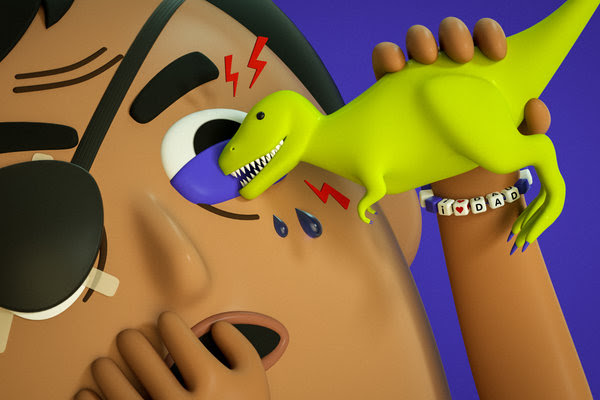WHEN TODDLERS ATTACK!
Jessica Grose

A year ago, my toddler accidentally stabbed me in the right eye with a Doc McStuffins otoscope. I can’t really blame her. First of all, she was 2. Secondly, she had an ear infection, and I was trying to give her medicine, and so got extremely close to her face. She was flailing her arms in self-defense, and she just happened to have that purple plastic toy in one of her hands.
I tried to shrug off the injury. I went to work and suffered through several meetings. Then I went to buy an eye patch, thinking if I just closed my eye for long enough it would feel better. It didn’t help, and made me look like a pirate.
Later that day, I went to an ophthalmologist, who told me that I had a corneal abrasion and gave me prescription eye drops. I asked if this was a common injury for parents of young children, and he said yes, but that usually he sees it in parents of infants, who scratch their parents’ eyes with their talon-sharp nails. I was lucky that there was no lasting damage to my poor peeper.
Anecdotally, we at NYT Parenting have heard from many people who were accidentally injured by their small children. The biggest offenders are stepped-on Legos and L.O.L. Surprise! doll detritus, but head-butting is also an issue for parents of babies, who tend to have poor motor skills. Teresa Bowen-Spinelli, M.D., an emergency room physician in New York, said it’s typical to see twisted or broken ankles from tripping over toys and broken noses from head-butting.
But also, for men, she’s seen “injury to genitalia.” Maybe a kid throws a ball or swings a bat in unfortunately close range of your nethers, or you’re roughhousing and get an errant foot to the groin. Dr. Bowen-Spinelli said, however, that she’s never seen a really bad case of injured genitals, “because kids don’t exert that much brute force.”
So, how do you prevent injury by your little ones, who by definition can’t fully control their limbs yet, and who aren’t great at recognizing their physical limitations? Aaron E. Carroll, M.D., an NYT Parenting contributor and a professor of pediatrics at Indiana University School of Medicine, said that the first thing to do is to be aware of the unpredictability of their thrashing. Understand that little kids “don’t have the guardrails of personal space,” and don’t understand when they “need to be more careful about flailing around,” he said. “They don’t have the same kind of differentiation between emotional and physical actions. When they might be frustrated or upset,” they don’t know how not to react physically.
With babies who are still getting their necks in control, be careful about getting very close to their faces, Dr. Carroll said. Both doctors recommended being mindful of your baby’s nails, and making sure to trim them frequently, for your safety but also for the baby’s. (If clipping your baby’s nails freaks you out, filing them is a good option, Dr. Carroll said. Dr. Bowen-Spinelli recommended cutting babies’ nails while they sleep, because they may struggle less.) If you’re giving your kid medicine she doesn’t want, as I did, Dr. Carroll suggested making it a two-person job, where one caretaker holds down the kid’s arms while the other squirts antibiotics into her mouth.
If your kid does accidentally hurt you, Dr. Carroll recommended keeping that string of expletives that you undoubtedly want to shout under control. “If it is by accident, don’t overreact, don’t scream and yell,” Dr. Carroll said. If your child is old enough (for many by age 2, though you know your kid’s cognitive abilities best), try to give him positive instruction about watching where he puts his body. And make sure you’re giving what Dr. Carroll calls “anticipatory guidance.” Which is to say: If your 3-year-old is learning how to play tennis, keep a close eye on that racket, because you can bet that a preschooler with a racket is capable of causing accidental physical damage.
Overall, though, some of these injuries may not be preventable — part of the fun of kids is their physical spontaneity and excitable play, and we don’t want to take that away from them, or from us. But, dudes, you may want to wear a cup.



